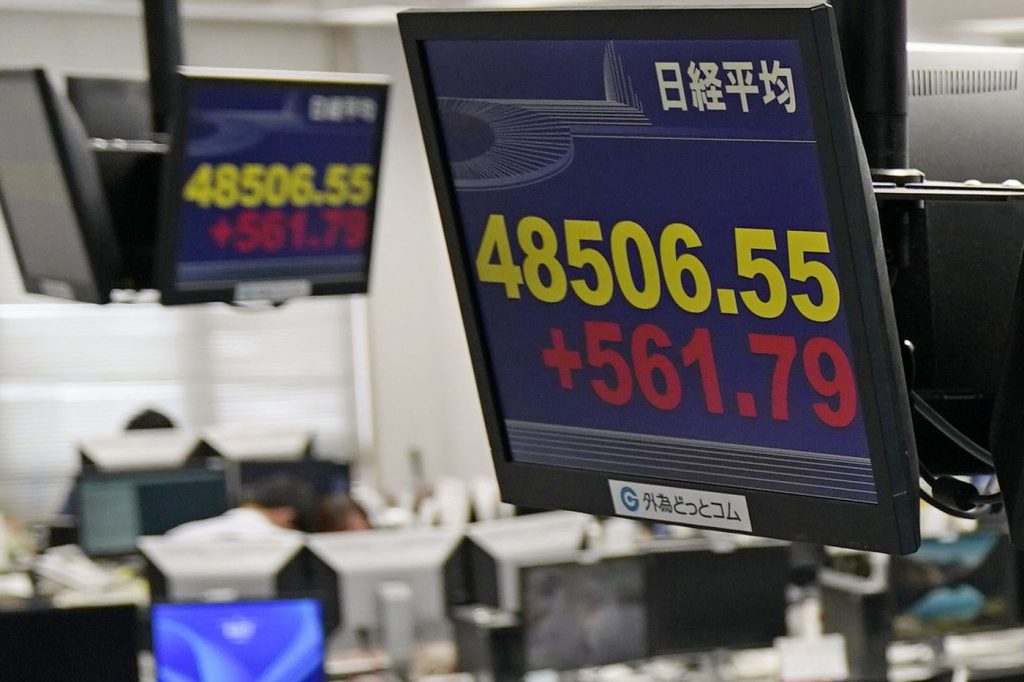Asian shares experienced a mostly positive trend on Thursday, buoyed by record highs in U.S. stock markets after a brief period of volatility. The reopening of mainland China markets following a weeklong holiday saw significant gains of over 1%. However, U.S. futures indicated a slight decline.
In the oil market, prices fell after an agreement was reached on Wednesday between Israel and Hamas to pause fighting in Gaza. This agreement facilitates the release of remaining hostages in exchange for Palestinian prisoners, marking a significant breakthrough in the ongoing two-year conflict and reducing regional tensions. U.S. benchmark crude prices decreased by 44 cents, settling at $62.11 per barrel, while Brent crude fell by 38 cents to $65.87 per barrel.
Gold prices, after reaching impressive highs, saw a slight decline but remained strong at $4,048.20 per ounce as of Thursday morning. In Japan, the Nikkei 225 index surged by 1.3%, reaching 48,369.90, largely driven by SoftBank Group's remarkable increase of over 11% following its announcement of a $5.4 billion deal to acquire a robotics unit from Swiss engineering giant ABB.
The Hang Seng index in Hong Kong experienced a marginal increase of less than 0.1% to 26,840.95, while the Shanghai Composite index rose by 1.2% to 3,931.07 in its first trading session since the start of October. Australia's S&P/ASX 200 posted a modest increase of 0.2%, reaching 8,965.90, and Taiwan's Taiex climbed 1.3%.
On Wall Street, U.S. stocks continued their upward trajectory, with the S&P 500 rising by 0.6% to hit a new record of 6,735.72. This increase came a day after it had ended a seven-day winning streak. The Dow Jones Industrial Average saw a minor dip of less than 0.1%, landing at 46,601.78, while the Nasdaq composite achieved a record of 23,043.38 with a 1.1% increase.
Recent trading activity has been relatively subdued due to the U.S. government’s latest shutdown, which has delayed the release of several key economic reports typically influential to market movements. The absence of these reports, alongside a lack of significant signals affecting expectations regarding interest rate cuts by the Federal Reserve, has resulted in drifting stock values since April.
Another notable factor behind the recent market surges is the overwhelming interest in artificial intelligence technology. Advanced Micro Devices (AMD) gained another 11.4%, contributing to its earlier rally launched by an AI-related announcement. AMD's performance made it the best-performing stock within the S&P 500. Following closely was Dell Technologies, which added 9.1% to its growth attributed to AI-related prospects.
Moreover, Poet Technologies saw a staggering 17% increase after announcing a $75 million investment aimed at enhancing its growth in high-speed optical engines utilized in the AI market. The upswing in AI-related stocks has been marked by impressive performances this year, with Nvidia witnessing a nearly 41% rise, Oracle up 73.2%, and Palantir Technologies more than doubling its value with a 143% surge.
However, the rapid increase in stock values has led to growing concerns about potential overvaluation, echoing sentiments from the dot-com bubble of the early 2000s, which ultimately resulted in a substantial market crash where the S&P 500 lost half its value.
In the currency market, the U.S. dollar fell against the Japanese yen, dropping to 152.57 from 152.70 yen, while the euro appreciated to $1.1646 up from $1.1629.











